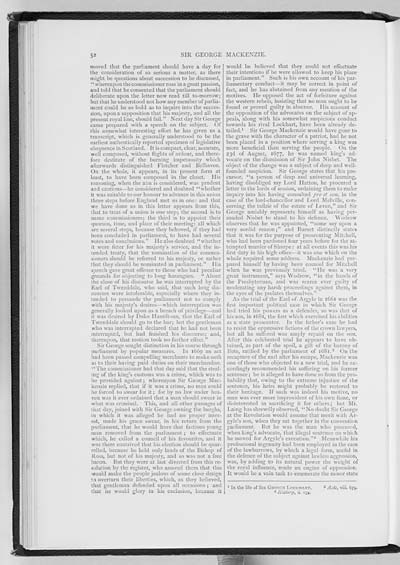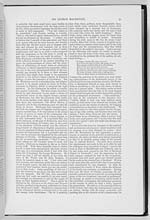52
moved that the parliament should have a day for
the consideration of so serious a matter, as there
might be questions about succession to be discussed,
"whereupon the commissioner rose in a great passion,
and told that he consented that the parliament should
deliberate upon the letter now read till to-morrow;
but that he understood not how any member of parlia-
ment could be so bold as to inquire into the succes-
sion, upon a supposition that his majesty, and all the
present royal line, should fail." Next day Sir George
came prepared with a speech on the subject. Of
this somewhat interesting effort he has given us a
transcript, which is generally understood to be the
earliest authentically reported specimen of legislative
eloquence in Scotland. It is compact, clear, accurate,
well composed, without flights of ardour, and there-
fore destitute of the burning impetuosity which
afterwards distinguished Fletcher and Belhaven.
On the whole, it appears, in its present form at
least, to have been composed in the closet. His
reasoning, when the aim is considered, was prudent
and cautious�he considered and doubted "whether
it was suitable to our honour to advance in this union
three steps before England met us in one: and that
we have done so in this letter appears from this,
that to treat of a union is one step; the second is to
name commissioners; the third is to appoint their
quorum, time, and place of their meeting: all which
are several steps, because they behoved, if they had
been concluded in parliament, to have had several
votes and conclusions." He also doubted "whether
it were fitter for his majesty's service, and the in-
tended treaty, that the nomination of the commis-
sioners should be referred to his majesty, or rather
that they should be nominated in parliament." His
speech gave great offence to those who had peculiar
grounds for objecting to long harangues. " About
the close of his discourse he was interrupted by the
Earl of Tweeddale, who said, that such long dis-
courses were intolerable, especially where they in-
tended to persuade the parliament not to comply
with his majesty's desires�which interruption was
generally looked upon as a breach of privilege�and
it was desired by Duke Hamiltoun, that the Earl of
Tweeddale should go to the bar; but the gentleman
who was interrupted declared that he had not been
interrupted, but had finished his discourse; and,
thereupon, that motion took no further effect."
Sir George sought distinction in his course through
parliament by popular measures. In 1669 an act
had been passed compelling merchants to make oath
as to their having paid duties on their merchandise.
"The commissioner had that day said that the steal-
ing of the king's customs was a crime, which was to
be provided against; whereupon Sir George Mac-
kenzie replied, that if it was a crime, no man could
be forced to swear for it; for by no law under hea-
ven was it ever ordained that a man should swear in
what was criminal. This, and all other passages of
that day, joined with Sir George owning the burghs,
in which it was alleged he had no proper inter-
est, made his grace swear, in his return from the
parliament, that he would have that factious young
man removed from the parliament; to effectuate
which, he called a council of his favourites, and it
was there contrived that his election should be quar-
relled, because he held only lands of the Bishop of
Ross, but not of his majesty, and so was not a free
baron. But they were at last diverted from this re-
solution by the register, who assured them that this
would make the people jealous of some close design
to overturn their liberties, which, as they believed,
that gentleman defended upon all occasions; and
that he would glory in his exclusion, because it
would be believed that they could not effectuate
their intentions if he were allowed to keep his place
in parliament." Such is his own account of his par-
liamentary conduct�it may be correct in point of
fact, and he has abstained from any mention of the
motives. He opposed the act of forfeiture against
the western rebels, insisting that no man ought to be
found or proved guilty in absence. His account of
the opposition of the advocates on the subject of ap-
peals, along with his somewhat suspicious conduct
towards his rival Lockhart, have been already de-
tailed.1 Sir George Mackenzie would have gone to
the grave with the character of a patriot, had he not
been placed in a position where serving a king was
more beneficial than serving the people. On the
23d of August, 1677, he was named king's ad-
vocate on the dismission of Sir John Nisbet. The
object of the change was a subject of deep and well-
founded suspicion. Sir George states that his pre-
cursor, "a person of deep and universal learning,
having disobliged my Lord Hatton, he procured a
letter to the lords of session, ordaining them to make
inquiry into his having consulted pro et con. in the
case of the lord-chancellor and Lord Melville, con-
cerning the tailzie of the estate of Leven," and Sir
George amiably represents himself as having per-
suaded Nisbet to stand to his defence. Wodrow
observes that he was appointed, "some say upon a
very sordid reason;" and Burnet distinctly states
that it was for the purpose of prosecuting Mitchell,
who had been pardoned four years before for the at-
tempted murder of Sharpe: at all events this was his
first duty in his high office�it was one which on the
whole required some address. Mackenzie had pre-
pared himself by having been counsel for Mitchell
when he was previously tried. "He was a very
great instrument," says Wodrow, "in the hands of
the Presbyterians, and was scarce ever guilty of
moderating any harsh proceedings against them, in
the eyes of the prelates themselves."
As the trial of the Earl of Argyle in 1661 was the
first important political case in which Sir George
had tried his powers as a defender, so was that of
his son, in 1681, the first which exercised his abilities
as a state prosecutor. In the father's case he had
to resist the oppressive fictions of the crown lawyers,
but all he suffered was amply repaid on the son.
After this celebrated trial he appears to have ob-
tained, as part of the spoil, a gift of the barony of
Bute, ratified by the parliament of 1681.2 On the
recapture of the earl after his escape, Mackenzie was
one of those who objected to a new trial, and he ac-
cordingly recommended his suffering on his former
sentence; he is alleged to have done so from the pro-
bability that, owing to the extreme injustice of the
sentence, his heirs might probably be restored to
their heritage. If such was indeed his motive, no
man was ever more improvident of his own fame, or
disinterested in sacrificing it for others; but Mr.
Laing has shrewdly observed, "No doubt Sir George
at the Revolution would assume that merit with Ar-
gyle's son, when they sat together in the convention
parliament. But he was the man who procured,
when king's advocate, that illegal sentence on which
he moved for Argyle's execution."3 Meanwhile his
professional ingenuity had been employed in the case
of the lawburrows, by which a legal form, useful in
the defence of the subject against lawless aggression,
was, by adding to its natural power the weight of
the royal influence, made an engine of oppression.
It would be a vain task to enumerate the minor state
1 In the life of SIR GEORGE LOCKHART. 2 Acts, viii. 679.
3 History, �. 154.

![]() Universal Viewer |
Universal Viewer | ![]() Mirador |
Large image | Transcription
Mirador |
Large image | Transcription
![]()

